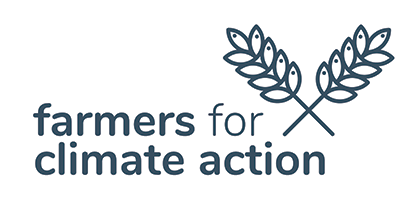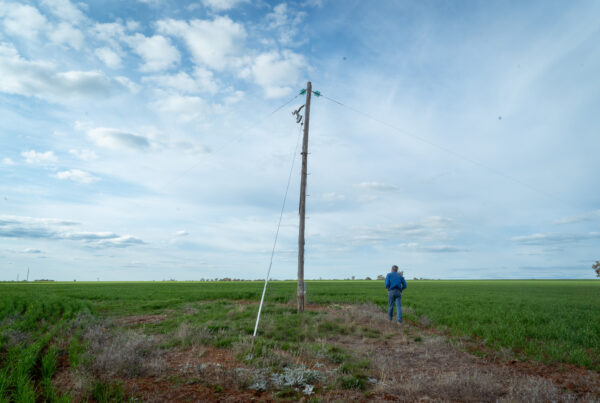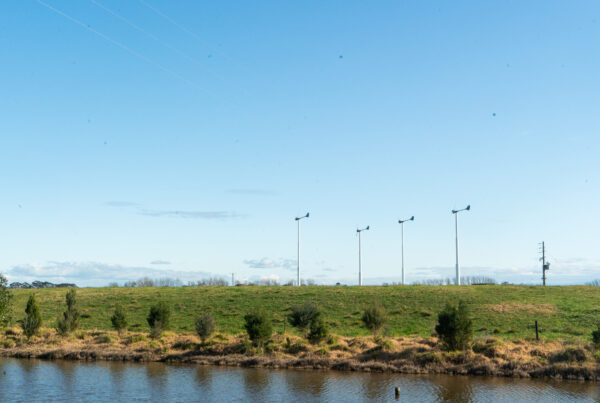27 January 2022
The Hon Stephen Jones MP
Assistant Treasurer
PO Box 6022
House of Representatives
Parliament House
Canberra ACT 2600
Dear Assistant Treasurer,
RE: Farmers for Climate Action 2023-24 Pre-Budget Submission
Farmers for Climate Action would like to thank the Treasurer and Assistant Treasurer for the opportunity to provide a submission for the 2023-24 Budget. Farmers for Climate Action is a movement of farmers, agricultural leaders and rural Australians pushing for Australia to adopt strong climate policies. We represent more than 7,500 farmers across Australia, and our supporter base includes more than 35,000 Australians committed to economy wide climate action.
Agricultural production is forecast to reach $85 billion in gross value for 2022-23 and contributed almost 2% of Australia’s total Gross Domestic Product (GDP) in 2020-21 at farm-gate alone. Australian farmers also produce over 90% of the food consumed in this country, yet still manage to export around two thirds every year. Agriculture accounted for 2.5% of employment in 2020-21.
In addition, agriculture has already made a significant contribution to emission reductions since the 1990s. Acting on climate change provides opportunities for agriculture to diversify income streams and continue to innovate, and delaying action is a significant risk to the long-term viability of the sector. The agriculture sector has shown that it wants to play its part, but needs the support and leadership of the Federal Government to ensure the opportunities aren’t missed.
In this submission we have outlined a number of priorities and opportunities for investment in key programs to support Australian agriculture and emissions reduction. Our top three priority recommendations are:
- Fund a practical on-farm extension program to enable producers to understand, measure and reduce on-farm emissions.
- Commit funding from the Powering the Regions Fund to address the high capital costs of on-farm renewables and increase knowledge sharing, including through subsidising on-farm batteries to make them financially viable for farmers to invest in.
- Utilise the Rewiring the Nation Fund to provide a mechanism for improved benefit sharing arrangements for transmission hosts and communities, including higher annual payments to hosts, payments to impacted neighbours, and funding for community benefit programs.
More details and further recommendations are listed below.
Farmers for Climate Action developed two reports in 2022, Farm Powered focused on renewable energy opportunities for farmers and regions, and Fork in the Road focused on climate-related impacts on supply chains. Both reports demonstrate in different ways the extent of climate impacts on Australia’s agriculture sector while also providing solutions that will support farmers to thrive. Farmers for Climate Action is also developing a suite of recommendations that would inform a national climate change and agriculture strategy. These three bodies of work inform our recommendations below.
A national strategy for climate change and agriculture
The agriculture sector is both vulnerable to and partially responsible for the heightened challenges brought about by climate change. Agriculture contributed around 16% of Australia’s greenhouse gas emissions in the year to June 2022. This figure does not include energy or land clearing. To minimise the severity of projected impacts of the warming trend caused by increased GHG levels, the sector has an imperative to continue efforts in emissions mitigation and to accelerate cross-industry progress, backed by a supportive policy and investment framework.
Emissions reduction and innovation
In a recent survey of our farmer members, we found that overwhelmingly farmers would make climate-smart changes on their farm if they were supported to do so. Currently, there is a lack of readily available programs that are trusted, credible and practical. We have found that farmers just want to know who to turn to get the information required to reduce their emissions on farm.
1. Provide investment and mechanisms to support mitigation and adaptation solutions for specific commodities as well as the sector as a whole through the Powering the Regions Fund, including :
- Increased funding specifically for research, development, commercialisation and knowledge sharing of:
- Emissions reduction technologies and land management practices, particularly for difficult to abate gases such as nitrous oxide and methane;
- Adaptation strategies to support farmers to future proof production and maintain commercial viability.
- Support for farmers to invest in emissions reduction technologies and initiatives that are cost prohibitive, such as through an instant tax asset write off.
2. Fund a practical, long term on-farm extension program to enable producers to understand, measure and reduce on-farm emissions. This should utilise the existing network of extension providers, including RDCs, state governments, drought resilience hubs, Landcare networks and farmer led groups. This program could be similar to the Victorian On-Farm Action Plan Pilot or leverage the work underway in the Carbon Farming Outreach Program.
Resilient landscapes
Farmers manage more than 50% of Australia’s landmass, making them the stewards of a significant proportion of natural resources. These resources provide huge social, economic, cultural and environmental value, recognising this and valuing it is integral to a thriving agricultural sector.
As the Government is utilising natural capital markets as a key policy mechanism for addressing climate change and biodiversity, the Government must ensure these markets are operated with integrity, transparency and good governance, overseen by a genuinely independent body. These markets should not be used to continue harmful emissions and biodiversity losses by providing cheap offsets that rely heavily on false equivalencies. Nor should they be used to shift the burden of emissions reduction onto farmers and the land sector.
Recommendations to increase opportunities for farmers to enhance natural capital resources:
3. Invest in existing systems, such as NRM Regions, to employ a network of dedicated natural capital extension officers to:
- support farmers to understand baselines and options for their property;
- work with farmers to determine which schemes or approaches, if any, would work for them;
- optimise project co-benefits, such as biodiversity, water quality and social and cultural outcomes;
- increase participation in carbon farming;
- support alignment of carbon farming projects with regional NRM plans;
- support reviews and development of methods under the Emissions Reduction Fund to ensure continuous improvement and integrity.
4. Commit to fully funding the finalised National Soil Action Plan to ensure the health of the natural resource all farmers rely upon is prioritised.
Securing markets
The Australian agricultural sector is heavily dependent on the large corporate players in the global marketplace to operate effectively. Australian farmers export around 70% of what they produce. It is essential that the agriculture sector is fully prepared to deal with the shifts in the global marketplace that a changing climate will inevitably cause. Additional recommendations that relate to supply chains are included below.
5. Establish a standardised system to enable farmers to measure sustainability metrics using one universal framework. This will assist in minimising paperwork, best-utilising data, demonstrating credentials and remaining competitive in both domestic and international markets, as well as financial institutions. This could leverage the work already underway in the Australian Agricultural Sustainability Framework.
Making renewable energy work for rural australia
Australia’s public and private sectors are making much-needed investments as we shift from an energy system powered by coal, oil and gas to one powered by renewables and storage. These critical investments will power more industries and communities, creating hundreds of thousands of jobs in rural and regional areas as Australia significantly reduces emissions over coming decades.
Nationally, the imperative to rapidly deploy renewables is clear. This is key to achieving the deep emissions reductions we need to limit climate change impacts, protecting the future of farms and food security. It is crucial we capitalise on the huge opportunities at farm and regional level.
Provide incentives for farmers to purchase new technologies
6. Commit funding from the Powering the Regions Fund to address the high capital costs of on-farm renewables and increase knowledge sharing by:
- Introducing renewable energy incentives for farmers, supported by a national energy audit program, to increase rapid uptake on farms and reduce input costs.
- Subsidising on-farm batteries making them financially viable by reducing payback periods.
- Establishing an agricultural program within the Australian Renewable Energy Agency (ARENA) to fund demonstration and knowledge sharing projects for renewable energy and battery solutions on farm.
Reform regional distribution networks
7. Commit funding from Rewiring the Nation to ensure the distribution network is a valuable asset for regional people by:
- Establishing mid-scale community and farmer ‘informal REZs’ (outside of declared REZs) which identify under-utilised hosting capacity in the network and encourage dispersed 1-5MW solar developments.
- Trialling the carving out of a community energy component within a large scale REZ helping to develop and sustain social licence for large scale investments.
- Eliminating export limits which prevent farmers from exporting more renewable energy to the grid.
- Broadening the Australian Energy Regulator’s framework beyond a population density calculation, in determining infrastructure upgrades for the distribution network.
- Developing a plan that identifies areas to prioritise upgrades from Single Wire Earth Return (SWER) to three-phase across regional Australia.
8. Dedicate funding from the Powering the Regions Fund to pilot small-scale renewable powered hubs that share infrastructure and supply a local region with products and services such as green ammonia to urea processing.
Ensure large-scale renewables benefit regional communities
9. Utilise the Rewiring the Nation Fund to provide a mechanism for improved benefit sharing arrangements for transmission hosts and communities, including higher annual payments to hosts, payments to impacted neighbours, and funding for community benefit programs.
Combine energy and farming through agrivoltaics
10. The Federal Government allocate funding from Rewiring the Nation to establish an agrivoltaics research and knowledge sharing program to boost farm profitability and show communities that agriculture and energy production can co-exist.
Strengthening supply chains
The COVID-19 pandemic and recent floods have highlighted the vulnerabilities of our supply chains and food security to the impacts of climate change. During the first two months of 2022 much of central and northern Australia experienced food shortages due to the combined impact of flooding and the COVID-19 pandemic. The problem was not lack of food – there was plenty available on farms or in warehouses – but disruption to the supply chain required for its distribution. Similar disruptions continued throughout 2022. **
Climate change is the biggest threat to Australia’s food security, impacting the ability to source inputs for agricultural production, the production itself and the delivery of agricultural produce to its next destinations.
__
**Bridgett Hermann for ABC News, 28 November 2022, ‘WA road freight prices rise 20 per cent due to rail disruptions in eastern states’.
Build resilience
11. Commit at least $1 billion over four years for regional road and infrastructure reconstruction for councils impacted by flooding and other natural disasters to ensure the rebuild is to a standard that is more resilient to future disaster events.
Manage risk
12. Commission a National Agriculture Risk Assessment, to monitor existing and emerging risks affecting Australian producers and provide a framework to respond at the national level
If we act quickly on climate change, there are huge economic opportunities for farmers and regional Australians. Let’s not miss the opportunity to invest in secure, resilient jobs and livelihoods for farmers and regional Australians.
Please do not hesitate to get in touch with any questions about our recommendations.
Sincerely,
Georgia Webster
Acting CEO of Farmers for Climate Action







